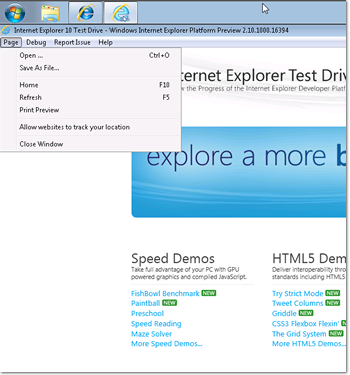Yesterday, Microsoft posted an interesting look at the current state of Internet Explorer 10 on its MSDN blog. In the article, readers will discover that Microsoft is touting a faster and more fluid experience, natural touch and gesture control, metro-influenced design elements and – to the dismay of advertisers everywhere – "Do Not Track" will be enabled by default.
For starters, IE10 will better appeal to the fine sensibilities of touchscreen users. Unsurprisingly, the browser will be bundled with Windows 8 – an operating system which is expected to be found on tablets and other touchscreen devices. As a result, Microsoft is touting its very own MSGesture touch gesture API which was inspired by Surface.
Other mobile operating systems such as Android and iOS include their own touch gesture APIs, but Microsoft appears to be improving upon those systems with a richer set of capabilities. IE10 will also come bundled with a touch-optimized version of Adobe Flash.
One of the most interesting elements about IE10 though, is its bold decision to turn on Do Not Track by default.
DNT, for those who aren't familiar with the idea, is an evolving, voluntary standard (or should I say set of non-standards?) by which users can opt out of web-based tracking mechanisms via a web browser setting.
There does not seem to be a central consensus on how to do this best. Firefox, for example, requires the website you're visiting to support and respect DNT while Chrome implements it only through an extension which prevents cookies from being persistent. Internet Explorer, on the other hand, takes Mozilla's voluntary approach but supplements it with a curated DNT protection list which blocks untrusted websites that don't honor DNT.
IE's respectively heavy-handed approach to DNT is one of two reasons why Microsoft's decision to turn it on by default is so fascinating.
The second reason? According to the Wall Street Journal, by enabling DNT out of the box, Microsoft is breaking an agreement made with the White House by the Digital Advertising Alliance – a consortium which includes Microsoft as a member. The DAA is likely concerned about Microsoft's unilateral decision because tracking is valuable to advertisers and advertising, as we all know, is what makes much of the web go 'round.
Interested in trying it out? The latest version of IE10 is bundled with the Windows 8 Release Preview that was made publicly available on May 31. Unfortunately, IE10 Release Preview 6 is only available for Windows 8.
